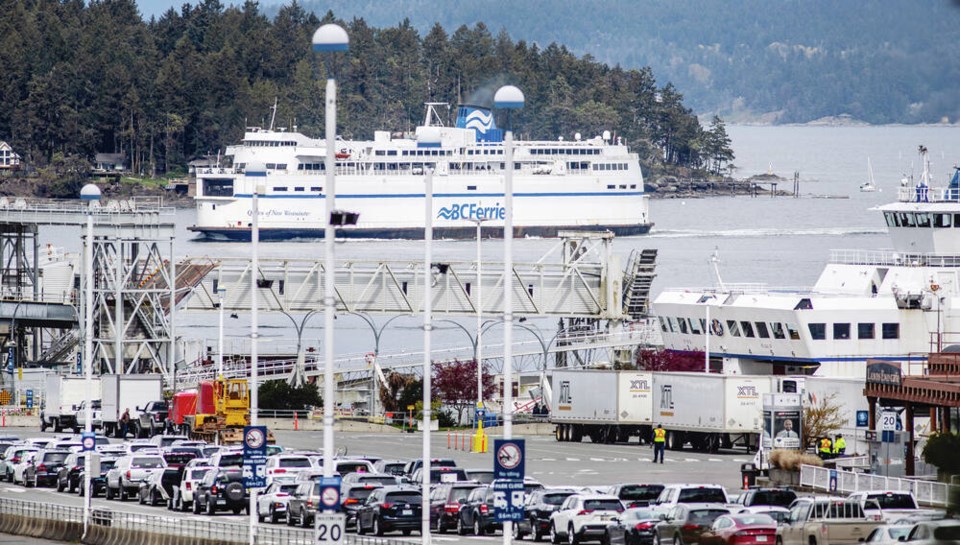A successful B.C. Ferries hiring blitz has brought in 500 new employees in five weeks with the company’s president saying it is leaving “no stone unturned” to add more mariners to its payroll in the wake of numerous sailing cancellations.
The company will announce a cash bonus within a month for staff who bring in certain categories of employees, president Mark Collins said Thursday after addressing a Greater Victoria Chamber of Commerce meeting.
Plus, “there will be a monetary incentive for joining us,” he said. Details were not immediately released.
One of the biggest barriers to hiring is the cost of housing, he said. That has prompted B.C. Ferries to consider the idea of live-aboard ships.
Salish-class vessels, for example, have a full deck of crew cabins and northern vessels have cabins as well, he said, suggesting that a crew member could live in Calgary and come in to work every two weeks.
The company is looking domestically and is ready to hire internationally. About 28 Ukrainian professional mariners are in the pipeline to work for B.C. Ferries, Collins said. “If you’ve got an international qualification and the government of Canada has given you your work permit, I have a job for you.”
B.C. Ferries has been struggling with crew shortages for several months, causing numerous sailings to be cancelled. A global shortage of trained mariners is making it difficult to fill empty positions and has prompted the company to come up with new ways to attract workers, Collins said.
“The biggest crime in my office is not coming in with ideas,” he said. “Everybody is pulling out the stops to be as creative and as bold as they can be.”
He is optimistic that the new hires will drastically reduce sailing cancellations.
The B.C. Ferry and Marine Workers’ Union has characterized the worker shortage as due to a lack of foresight and staff training. Collins said the staff shortage basically began in January when the Omicron variant “exploded” and large numbers of workers had to book off sick.
The company acknowledges it had been facing a shortage of trained mariners prior to the COVID-19 pandemic.
Transport Canada sets the minimum number of trained workers required for a ferry to operate. If there aren’t enough workers, the ferry can’t sail.
These days, B.C. Ferries is dealing with about 11 per cent of its workers off at one time, up from a typical four per cent, Collins said. COVID and other health issues are responsible.
About two-thirds of the new hires are entry-level seasonal workers, many recruited through hiring fairs in B.C. A six-member internal team, expanded from two, is dedicated to hiring, training and retention, he said.
Potential employees are asking plenty of questions, wanting to know about COVID protocols, benefits and more.
“It’s a hot market and they want to know they are making the right decision to them to join us. So we are having to work harder to get each employee.”
B.C. Ferries typically hires 250 to 300 seasonal workers each year. That did not happen in 2021 because of the pandemic. Many seasonal hires remain with the company, moving into different job categories.
Without seasonal workers last year, they were not available to move into permanent jobs. “So our permanent categories are a little down,” Collins said, adding that’s why more are being hired this year.
He expects that seasonal and casual (on call permanent workers) targets will be met this year.
“But we are about 100 short on deck and engineering officers and we are basically filling it in with overtime. Hiring into those categories is extremely difficult. These are highly trained and highly sought after individuals and there’s not many of them.”
With the new hires, B.C. Ferries has approximately 5,400 employees.
Federal and provincial governments stepped up with funding when COVID slammed the company’s bottom line and that allowed B.C. Ferries to resume training and development, he said.
B.C. Ferries recruits from marine colleges in Canada and posts jobs on hiring boards on the internet, which can attract international workers.



